10 Music Reviews
by dave heaton
Astronaut, Times New Romance (Pause)
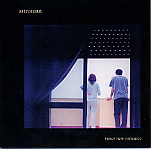 Pay attention to Rebeca Gargallo's ghostly backing vocals in the background of "Living the Scene," the opening track of the Spanish band Astronaut's debut full-length Times New Romance: she'll be back three songs later to blow you away with a clear-as-day, pretty art-folk song about dreams and seashores and the way the surfaces of things conceals and entices. The album has a few crystalline ballads with her on lead vocals, singing sweetly but sadly. Those songs might get to the band's melancholy air in a direct-to-the-heart way, but for the rest of the album the six-member band (plus seven guests, on flute, trumpet, clarinet, cello and piano) weaves more impressionistic tapestries that get to the exact same feelings in a way that's just as heartfelt but also larger-than-life. The passing of time, the pain of loss and the mystery of dreams all find their way from song to song, whether it's an orchestral, slowly floating pop-rock song with Eduardo Guzmān's grave vocals (or the lighter mix of Guzmān and Gargallo's voices blending perfectly) or a gorgeous, wrap-around instrumental storm. An intoxicating album through and through.
Pay attention to Rebeca Gargallo's ghostly backing vocals in the background of "Living the Scene," the opening track of the Spanish band Astronaut's debut full-length Times New Romance: she'll be back three songs later to blow you away with a clear-as-day, pretty art-folk song about dreams and seashores and the way the surfaces of things conceals and entices. The album has a few crystalline ballads with her on lead vocals, singing sweetly but sadly. Those songs might get to the band's melancholy air in a direct-to-the-heart way, but for the rest of the album the six-member band (plus seven guests, on flute, trumpet, clarinet, cello and piano) weaves more impressionistic tapestries that get to the exact same feelings in a way that's just as heartfelt but also larger-than-life. The passing of time, the pain of loss and the mystery of dreams all find their way from song to song, whether it's an orchestral, slowly floating pop-rock song with Eduardo Guzmān's grave vocals (or the lighter mix of Guzmān and Gargallo's voices blending perfectly) or a gorgeous, wrap-around instrumental storm. An intoxicating album through and through.
Crispy Ambulance, ThePowderBlindDream (Darla)
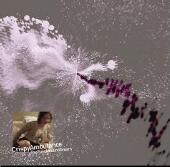 A Factory-era post-punk band pushing on after their 1999 reincarnation (which came 17 years after their original break-up), Crispy Ambulance play their songs like they didn't disappear for nearly twenty years, with the same devilish energy they displayed in their youth. ThePowderBlindDream is their third studio album, after 1982's The Plateau Phase and 2002's Scissorgun, and replicates the same basic sound of those albums: moody, intense rock with the energy of punk and the shadows of a haunted house. Some of those qualities have them incessantly compared to their contemporaries Joy Division, but that comparison shouldn't be overplayed (it is a fair starting place, but not the whole story, and unfortunately Crispy Ambulance's career is often reduced to a Joy Division imitation and nothing more). My favorite aspect of Crispy Ambulance's music is when they push off into the most mysterious places, usually with their guitars, as on the brilliant opening to "Chimera." For me ThePowderBlindDream has too few of those ambiguous moments - overall aggression often overtakes mystery, and sometimes threatens to make their music sound too conventionally rock for my tastes (especially in the first half - don't give up before the end, or you'll miss the odd dreamland that is "Pain & Pleasure," the album's final track and one of its most intriguing). There's still enough dark poetry in the lyrics, and enough sharp guitar turns, to make the album truly riveting at times, even though I also find it blurring past me somewhat indistinctly in places.
A Factory-era post-punk band pushing on after their 1999 reincarnation (which came 17 years after their original break-up), Crispy Ambulance play their songs like they didn't disappear for nearly twenty years, with the same devilish energy they displayed in their youth. ThePowderBlindDream is their third studio album, after 1982's The Plateau Phase and 2002's Scissorgun, and replicates the same basic sound of those albums: moody, intense rock with the energy of punk and the shadows of a haunted house. Some of those qualities have them incessantly compared to their contemporaries Joy Division, but that comparison shouldn't be overplayed (it is a fair starting place, but not the whole story, and unfortunately Crispy Ambulance's career is often reduced to a Joy Division imitation and nothing more). My favorite aspect of Crispy Ambulance's music is when they push off into the most mysterious places, usually with their guitars, as on the brilliant opening to "Chimera." For me ThePowderBlindDream has too few of those ambiguous moments - overall aggression often overtakes mystery, and sometimes threatens to make their music sound too conventionally rock for my tastes (especially in the first half - don't give up before the end, or you'll miss the odd dreamland that is "Pain & Pleasure," the album's final track and one of its most intriguing). There's still enough dark poetry in the lyrics, and enough sharp guitar turns, to make the album truly riveting at times, even though I also find it blurring past me somewhat indistinctly in places.
Drew Danburry, An Introduction to Sex Rock (Mother Clucker Records)
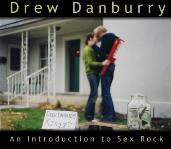 Drew Danburry falls in love with every girl he meets, judging by most of the songs on his album An Introduction to Sex Rock. The album has 19 songs, and damn near all of them seem to be about falling head over heels for somewhere you barely know, and trying to sort out the lines between love and lust and friendship. "I can't help but fall in love," he sings at one point, "It's just a crush but I get so attached," he reveals at another. Then there's this: "It must clearly be love when you mean so much and I barely even know you." There's nothing creepy about the album, even if he comes off as a borderline stalker from time to time. Rather, these are tender pop-rock songs performed very much like a less dramatic Bright Eyes, and most of them are quite good. There's also a DIY, slightly messy atmosphere about the album, which makes you think backwards past Conor and towards Lou Barlow's home recordings. It's an endearing style, reminding you of when musicians didn't take everything they did so seriously. Danburry likes to fool around with his music; if that isn't evident from song titles like "I Hope This Song Is So Good It Reminds You of Wizards" and "I Am a Normal Healthy Person Which Means I Have Lots of Problems" it's really clear when he picks up what sounds like a recorder or messes around for minutes on what sounds like a xylophone. That playfulness turns out to be his Achilles' Heel, though; the 11th track is a 6-minute, horrible rap song that only people who don't listen to hip-hop would ever mistake as good. Even worse, it's untalented rappers going on about why hip-hop needs to change, which is ridiculous even if they're kidding around (but are they?). He raps worse than Graham Smith, and that's saying something. It's hard not to angrily shut the CD off at that point (once some lines are crossed, you can never go back). Turn off the CD at that point, though, and you'll miss 8 more songs, including some of the album's best.
Drew Danburry falls in love with every girl he meets, judging by most of the songs on his album An Introduction to Sex Rock. The album has 19 songs, and damn near all of them seem to be about falling head over heels for somewhere you barely know, and trying to sort out the lines between love and lust and friendship. "I can't help but fall in love," he sings at one point, "It's just a crush but I get so attached," he reveals at another. Then there's this: "It must clearly be love when you mean so much and I barely even know you." There's nothing creepy about the album, even if he comes off as a borderline stalker from time to time. Rather, these are tender pop-rock songs performed very much like a less dramatic Bright Eyes, and most of them are quite good. There's also a DIY, slightly messy atmosphere about the album, which makes you think backwards past Conor and towards Lou Barlow's home recordings. It's an endearing style, reminding you of when musicians didn't take everything they did so seriously. Danburry likes to fool around with his music; if that isn't evident from song titles like "I Hope This Song Is So Good It Reminds You of Wizards" and "I Am a Normal Healthy Person Which Means I Have Lots of Problems" it's really clear when he picks up what sounds like a recorder or messes around for minutes on what sounds like a xylophone. That playfulness turns out to be his Achilles' Heel, though; the 11th track is a 6-minute, horrible rap song that only people who don't listen to hip-hop would ever mistake as good. Even worse, it's untalented rappers going on about why hip-hop needs to change, which is ridiculous even if they're kidding around (but are they?). He raps worse than Graham Smith, and that's saying something. It's hard not to angrily shut the CD off at that point (once some lines are crossed, you can never go back). Turn off the CD at that point, though, and you'll miss 8 more songs, including some of the album's best.
The Fall, 50,000 Fall Fans Can't Be Wrong... (Beggars Banquet)
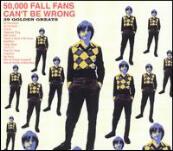 Take The Fall - mad legends who've released an uncountable number of songs between the 70s and today, influencing legions of so-called college rock and alt-rock bands in the process (most explicitly Pavement and their minions) - and try to encapsulate their career in just 2 CDs. It seems like a no-win situation; you'll always be leaving so much out, no matter what you pick. Yet 50,000 Fall Fans Can't Be Wrong: 39 Golden Greats feels like a successful attempt at a survey, if only because it's such a solid collection, a power-packed journey through the mind of Mark E. Smith, and through the various bizarre trips that mind has taken Fall fans on over the decades. The set starts with the dark humor of the slow-punk romp "Repetition" and goes chronologically through their career, as the edgy guitars of the 70s lead into the glossier sheen of the 80s (which in its own way makes their music sound even stranger, with pop production being twisted to strange ends) and so on. I'll be straight with you and throw out any review-speak about this being a "definitive collection" or some such hogwash. Here's the truth: I've always been intrigued by The Fall but know very little of their music. Thus I can't say if 50,000 Fall Fans Can't Be Wrong has all of the best songs, touches on all the important periods in the Fall's career, or not. What I can say is that the music on here is blazing hot from start to finish, that both CDs showcase an eccentric, genius style of punk-meets-new wave rock that this collection has me falling in love with. If you've had the time to track down everything the Fall ever released more power to you. So far in this life I haven't found that time, so for now 50,000 Fall Fans will do nicely.
Take The Fall - mad legends who've released an uncountable number of songs between the 70s and today, influencing legions of so-called college rock and alt-rock bands in the process (most explicitly Pavement and their minions) - and try to encapsulate their career in just 2 CDs. It seems like a no-win situation; you'll always be leaving so much out, no matter what you pick. Yet 50,000 Fall Fans Can't Be Wrong: 39 Golden Greats feels like a successful attempt at a survey, if only because it's such a solid collection, a power-packed journey through the mind of Mark E. Smith, and through the various bizarre trips that mind has taken Fall fans on over the decades. The set starts with the dark humor of the slow-punk romp "Repetition" and goes chronologically through their career, as the edgy guitars of the 70s lead into the glossier sheen of the 80s (which in its own way makes their music sound even stranger, with pop production being twisted to strange ends) and so on. I'll be straight with you and throw out any review-speak about this being a "definitive collection" or some such hogwash. Here's the truth: I've always been intrigued by The Fall but know very little of their music. Thus I can't say if 50,000 Fall Fans Can't Be Wrong has all of the best songs, touches on all the important periods in the Fall's career, or not. What I can say is that the music on here is blazing hot from start to finish, that both CDs showcase an eccentric, genius style of punk-meets-new wave rock that this collection has me falling in love with. If you've had the time to track down everything the Fall ever released more power to you. So far in this life I haven't found that time, so for now 50,000 Fall Fans will do nicely.
The Flower Machine, Chalk Dust Dream of the Tea Cozy Mitten Company (Microindie)
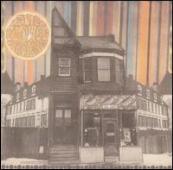 I'm tempted to reduce The Flower Machine to this quick description: an American version of The Clientele. That's unfair, of course, but not that unfair. The Flower Machine have that laidback, vaguely 60s, daydream pop thing down, with melodies as pretty as a hazy rainy day. And they sound remarkably like The Clientele would if they had a sunnier disposition and were a lot less interested in surrealism and avant garde art. The Flower Machine have the same starry-eyed pop sound but they feel more grounded, less likely to drift off to unexpected places. I don't know if that's a good or a bad thing - my personal tastes tend to say it's the latter, yet when the songs are this pretty and the melodies this memorable, who am I to complain? Chalk Dust Dream certainly isn't a journey to new territory, but it has a remarkably easygoing and enjoyable mood about it, the kind that puts you in a meditative but not exactly sad frame of mind. It's introspective music, but with an overall optimistic, isn't-life-grand mentality replacing the world of hurt that inhabits much music like this. In other words, The Flower Machine are uniting a gentle, moody style of pop with a more uplifting, California hippy vibe, with pleasant results.
I'm tempted to reduce The Flower Machine to this quick description: an American version of The Clientele. That's unfair, of course, but not that unfair. The Flower Machine have that laidback, vaguely 60s, daydream pop thing down, with melodies as pretty as a hazy rainy day. And they sound remarkably like The Clientele would if they had a sunnier disposition and were a lot less interested in surrealism and avant garde art. The Flower Machine have the same starry-eyed pop sound but they feel more grounded, less likely to drift off to unexpected places. I don't know if that's a good or a bad thing - my personal tastes tend to say it's the latter, yet when the songs are this pretty and the melodies this memorable, who am I to complain? Chalk Dust Dream certainly isn't a journey to new territory, but it has a remarkably easygoing and enjoyable mood about it, the kind that puts you in a meditative but not exactly sad frame of mind. It's introspective music, but with an overall optimistic, isn't-life-grand mentality replacing the world of hurt that inhabits much music like this. In other words, The Flower Machine are uniting a gentle, moody style of pop with a more uplifting, California hippy vibe, with pleasant results.
For Stars, ...It Falls Apart (Future Farmer)
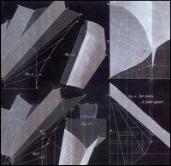 "You should have seen her when it all began...," For Stars' fourth album ...It Falls Apart opens cinematically, leading us into a complex album-length story of betrayal, jealousy, pain, the death of innocence...in essence, of love falling apart. Singer Carlos Forster probes these feelings in a deep, really piercing way on every song, and the songs are beautifully arranged, filled with open space, subtly dramatic build-ups, and winning melodies to complement all of the emotional intensity. Keyboard waves flow through these carefully paced mood-rock songs like a melancholy throughline through the album, while Forster sings his heart out, tearing it apart in the process. The perspective on love switches from 'I shouldn't have done what I did to her' to 'she's a crazy woman who stole my soul' to every extreme in between. This is an album with a generally bittersweet air, where that feeling that everything's so much tougher than you want it to be is haunting everything. A beautifully sad album.
"You should have seen her when it all began...," For Stars' fourth album ...It Falls Apart opens cinematically, leading us into a complex album-length story of betrayal, jealousy, pain, the death of innocence...in essence, of love falling apart. Singer Carlos Forster probes these feelings in a deep, really piercing way on every song, and the songs are beautifully arranged, filled with open space, subtly dramatic build-ups, and winning melodies to complement all of the emotional intensity. Keyboard waves flow through these carefully paced mood-rock songs like a melancholy throughline through the album, while Forster sings his heart out, tearing it apart in the process. The perspective on love switches from 'I shouldn't have done what I did to her' to 'she's a crazy woman who stole my soul' to every extreme in between. This is an album with a generally bittersweet air, where that feeling that everything's so much tougher than you want it to be is haunting everything. A beautifully sad album.
Ghostface, The Pretty Toney Album Def Jam)
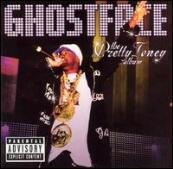 Ghostface Killah has dropped the "Killah" from his name and moved to a new label, and in the process has put some distance between himself and his fellow Wu-Tang clansmen. RZA produces two tracks here - besides that, no Wu-Tang members are to be found. That's a far cry from his other 3 solo albums, 2 of which featured Wu-Tang members (Raekwon, especially) on close to half the tracks. Going along with all of that, The Pretty Toney Album does find Ghostface in playboy/star mode, replacing Wu-Tang grit and examinations of his own psyche with gold chains and bathtubs of champagne. None of that matters though, when you can rhyme your ass off like Ghostface does here. He sounds half as self-reflective but twice as energetic, speed-rhyming over 70s soul classics like he was born to be an MC. He has his self-indulgent side, but it's mostly expressed through a skit here and there. Skip the skits, but play the songs loud and strong. Ghostface might be avoiding some of the dark corners he's explored before, but he's making confident music that's dynamic and filled with energy. If he's looking to become a star, at least he's doing it by making good, solid music, not by playing around on sitcoms.
Ghostface Killah has dropped the "Killah" from his name and moved to a new label, and in the process has put some distance between himself and his fellow Wu-Tang clansmen. RZA produces two tracks here - besides that, no Wu-Tang members are to be found. That's a far cry from his other 3 solo albums, 2 of which featured Wu-Tang members (Raekwon, especially) on close to half the tracks. Going along with all of that, The Pretty Toney Album does find Ghostface in playboy/star mode, replacing Wu-Tang grit and examinations of his own psyche with gold chains and bathtubs of champagne. None of that matters though, when you can rhyme your ass off like Ghostface does here. He sounds half as self-reflective but twice as energetic, speed-rhyming over 70s soul classics like he was born to be an MC. He has his self-indulgent side, but it's mostly expressed through a skit here and there. Skip the skits, but play the songs loud and strong. Ghostface might be avoiding some of the dark corners he's explored before, but he's making confident music that's dynamic and filled with energy. If he's looking to become a star, at least he's doing it by making good, solid music, not by playing around on sitcoms.
Hangar 18, The Multi-Platinum Debut Album (Definitive Jux)
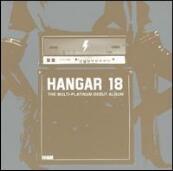 "This album is going to change the way you look at hip-hop...this is something that you can never get a grasp on," voices tell us at the start of Hangar 18's The Multi-Platinum Debut Album, the latest release from the generally cutting-edge hip-hop label Definitive Jux. Their braggadocio might be in jest (look at the way that the album's title is filled with jokey bluster), but judging by the two album tracks that were sneak-previewed on the Definitive Jux III compilation, I was ready to believe them. Those tracks both sounded fresh and new to me at the time, matching Alaska and Windnbreeze's word-heavy rhymes with paWL's light, cartoonish production. But context is everything, and a whole album of this routine reveals it to be a whole lot less compelling than I originally thought. Neither of the MCs has an especially distinctive flow, or anything interesting to say; they sound like they're covering the tracks with words just because they can. And paWL's synth-heavy, light-funk music starts out enticing but soon gets tiresome, as every track has the same sound and there's a general lack of energy to the beats that just pulls the life away from the album with every passing second. Even a decent guest spot from Sadat X goes nowhere towards making the album interesting enough to listen to more than once. I'm a big Def Jux defender and supporter, I love most of what they release, but this is, frankly, quite awful. It's an attempt to do something different, sure, but to what end?
"This album is going to change the way you look at hip-hop...this is something that you can never get a grasp on," voices tell us at the start of Hangar 18's The Multi-Platinum Debut Album, the latest release from the generally cutting-edge hip-hop label Definitive Jux. Their braggadocio might be in jest (look at the way that the album's title is filled with jokey bluster), but judging by the two album tracks that were sneak-previewed on the Definitive Jux III compilation, I was ready to believe them. Those tracks both sounded fresh and new to me at the time, matching Alaska and Windnbreeze's word-heavy rhymes with paWL's light, cartoonish production. But context is everything, and a whole album of this routine reveals it to be a whole lot less compelling than I originally thought. Neither of the MCs has an especially distinctive flow, or anything interesting to say; they sound like they're covering the tracks with words just because they can. And paWL's synth-heavy, light-funk music starts out enticing but soon gets tiresome, as every track has the same sound and there's a general lack of energy to the beats that just pulls the life away from the album with every passing second. Even a decent guest spot from Sadat X goes nowhere towards making the album interesting enough to listen to more than once. I'm a big Def Jux defender and supporter, I love most of what they release, but this is, frankly, quite awful. It's an attempt to do something different, sure, but to what end?
Venetian Snares, Huge Chrome Cylinder Box Unfolding (Planet Mu)
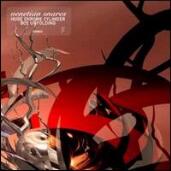 I keep misreading Venetian Snares as Venetian Snakes, which seems appropriate to me, as the music Aaron Funk makes under that name comes off like a cluster of snake-like beats and rhythms, weaving over each other in a wild, complicated way. His album Huge Chrome Cylinder Box starts off like a raging electronic animal, full of frenzy and mad energy. Though it all seems like chaos at first, as the album proceeds the mood turns glacial and peaceful in a way, within the context of hyperactive, fast-cut beats and textures. There are multiple interweaving melodies on every track, even if at first you feel lost in a jungle of conflicting sounds. Funk also slows things down to create a haunted space of calm, a tranquility informed by the language of robots (or are those Speak-n-Spells?) and algebra, giving the album a future-world feeling. The future's a cold place, in this vision, or is it? Ice-cold calculations are on the surface, but underneath lurks a warmer atmosphere built around jittery tunes, not to mention the warmth generated by sheer creativity and wild imagination.
I keep misreading Venetian Snares as Venetian Snakes, which seems appropriate to me, as the music Aaron Funk makes under that name comes off like a cluster of snake-like beats and rhythms, weaving over each other in a wild, complicated way. His album Huge Chrome Cylinder Box starts off like a raging electronic animal, full of frenzy and mad energy. Though it all seems like chaos at first, as the album proceeds the mood turns glacial and peaceful in a way, within the context of hyperactive, fast-cut beats and textures. There are multiple interweaving melodies on every track, even if at first you feel lost in a jungle of conflicting sounds. Funk also slows things down to create a haunted space of calm, a tranquility informed by the language of robots (or are those Speak-n-Spells?) and algebra, giving the album a future-world feeling. The future's a cold place, in this vision, or is it? Ice-cold calculations are on the surface, but underneath lurks a warmer atmosphere built around jittery tunes, not to mention the warmth generated by sheer creativity and wild imagination.
X-Ecutioners, Revolutions (Columbia)
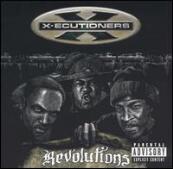 With each album the X-ecutioners are trying harder to figure out how to turn an innovative DJing career into a commercially successful music career. The path they took on their second album Built to Last is pushed further with this third album - that is, they've filled with album with guest spots and cross-genre collaborations. But like with the previous album, it mostly works quite well. It helps that the DJs seem seriously interested in where seemingly unlikely combinations of styles will take them. And they're still completely in tune with the force of pure, unleashed hip-hop. So Revolutions has completely raw hip-hop tracks like "Live From the PJs" (featuring Ghostface Killah, Trife and Black Thought) and "Back to Back" (featuring Saigon and Scram Jones) along with tentative steps into electronic dance music ("Like This") and rock ("Let Me Rock"). Most of the experiments work fairly well - they're at least interesting - until the last third of the album, when everything falls apart with a couple awful rock-rap disasters ("Get With It," featuring Cypress Hill, and the almost indescribably bad White Zombie remake "(Even) More Human Than Human", featuring Rob Zombie, Slug and Josey Scott) followed by a couple hip-hop songs (one with Dead Prez, one with Fat Joe and Aasim) that aren't terrible but aren't good enough to match the earlier successes, or erase the album's most awful moments from your mind. Overall, though, Revolutions finds the X-ecutioners looking for a route to success while genuinely, and sometimes successfully, experimenting with the intersections of hip-hop, rock, and electronic music.
With each album the X-ecutioners are trying harder to figure out how to turn an innovative DJing career into a commercially successful music career. The path they took on their second album Built to Last is pushed further with this third album - that is, they've filled with album with guest spots and cross-genre collaborations. But like with the previous album, it mostly works quite well. It helps that the DJs seem seriously interested in where seemingly unlikely combinations of styles will take them. And they're still completely in tune with the force of pure, unleashed hip-hop. So Revolutions has completely raw hip-hop tracks like "Live From the PJs" (featuring Ghostface Killah, Trife and Black Thought) and "Back to Back" (featuring Saigon and Scram Jones) along with tentative steps into electronic dance music ("Like This") and rock ("Let Me Rock"). Most of the experiments work fairly well - they're at least interesting - until the last third of the album, when everything falls apart with a couple awful rock-rap disasters ("Get With It," featuring Cypress Hill, and the almost indescribably bad White Zombie remake "(Even) More Human Than Human", featuring Rob Zombie, Slug and Josey Scott) followed by a couple hip-hop songs (one with Dead Prez, one with Fat Joe and Aasim) that aren't terrible but aren't good enough to match the earlier successes, or erase the album's most awful moments from your mind. Overall, though, Revolutions finds the X-ecutioners looking for a route to success while genuinely, and sometimes successfully, experimenting with the intersections of hip-hop, rock, and electronic music.
Copyright (c) 2005 erasing clouds |
|